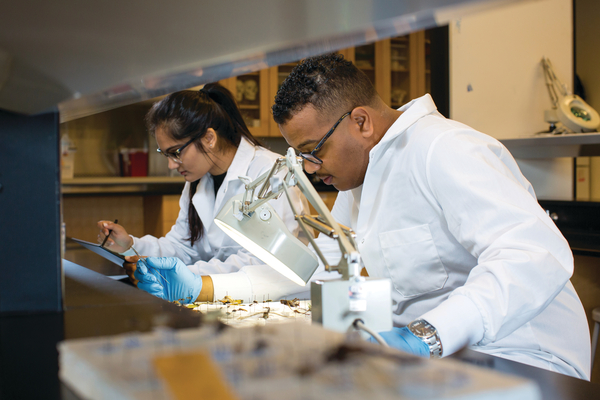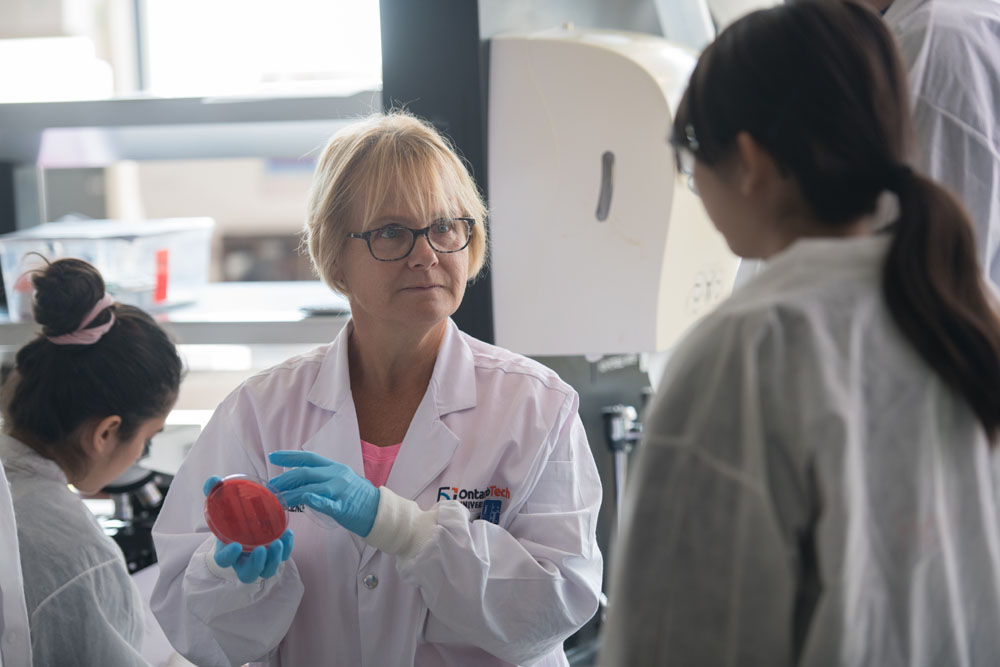Health Physics and Radiation Science
Overview
 Immerse yourself in one of Ontario's only Health Physics and Radiation Science programs, with a primary focus on the nuclear industry. Study in labs where you'll be using various instruments for radiation detection.
Immerse yourself in one of Ontario's only Health Physics and Radiation Science programs, with a primary focus on the nuclear industry. Study in labs where you'll be using various instruments for radiation detection. Energy supply, medicine, agriculture, national security, manufacturing and resource-based industries are all examples of where the use of radioactive materials or radiation-generating machines are an essential part of operations. Radiation is also used to study materials and matter on the atomic scale. Our curriculum is a combination of fundamental radiation science, technological methods and applications to prepare you for a successful career.
Our programs are designed in consultation with key industry representatives, and will provide you with necessary theoretical and applied skills to meet employers' needs.
This program is not accepting applicants for 2025.
Learning Environment
Students have access to new, modern buildings, libraries and innovative labs including:
- Corrosion and Electrochemistry Laboratory
- Energy Systems and Nuclear Science Research Centre (ERC)
- Environment Radiation Laboratory
- High-Performance Computing and Visualization Laboratory
- Nuclear Simulation Laboratory
- Radiation Protection Laboratory
- Scientific Instrumentation Laboratory
My internship made me career ready by rotating me through different areas based on my interests. The flexibility and different hands-on experiences provided me with a very clear picture of what I wanted to do after graduation. The internship program is truly outstanding. Before I graduated, I was offered a full-time position as an Assistant Analyst with Kinectrics which is where I work now. Keith Harrison Bachelor of Engineering (Honours) in Nuclear Engineering Class of 2019
Admissions
Admissions
Current Ontario secondary school students must complete the Ontario Secondary School Diploma (OSSD) with six 4U or 4M credits including English (ENG4U), Advanced Functions (MHF4U), and two of Biology (SBI4U), Calculus and Vectors (MCV4U), Chemistry (SCH4U) or Physics (SPH4U). In addition, a combined minimum 70 per cent average in prerequisite math and science courses is required. It is recommended that all four of MCV4U, SBI4U, SCH4U and SPH4U be taken.
This program is not accepting applicants for 2025.
Note: Admission is competitive. The specific average or standing required for admission varies from year to year. Students are selected by taking into consideration a wide range of criteria including school marks, distribution of subjects taken, and performance in subjects relevant to the academic program. Possession of the minimum requirements does not guarantee acceptance. Preference will be given to applicants with the best qualifications.
| Last year's cut-off | 70 per cent |
|---|---|
| Expected cut-off | Low 70s |
The application process and important dates/deadlines are outlined on our :
•
•
•
•
•
•
•
•
Career opportunities
- Environmental safety
- Non-destructive material testing
- Radiation applications in health care
- Radiation protection
Experiential learning
We offer a wide range of optional internship and co-op opportunities to help you gain valuable, relevant work experience to promote networking and lifelong career success.
Did you know?
-
Sample courses
- Loading...
- Loading...
- Loading...
- Loading...
- Loading...
- Loading...
- Loading...
- Loading...
- Loading...
- Loading...
- Loading...
- Loading...
- Loading...
- Loading...
- Loading...
- Loading...
- Loading...
- Loading...
- Loading...
- Loading...
- Loading...
- Loading...
- Loading...
- Loading...
- Loading...
- Loading...
- Loading...
- Loading...
- Loading...
- Loading...
- Loading...
- Loading...
For program requirements, including required number of credits for completion, program maps and course descriptions, please see the academic calendar and course catalogue of Loading.... Courses are subject to change without notice.


